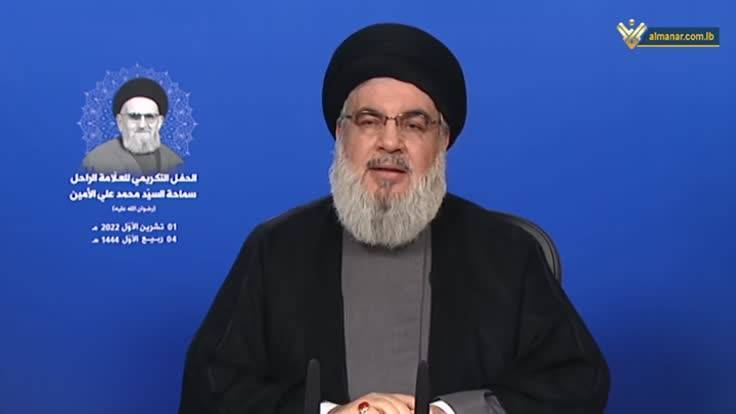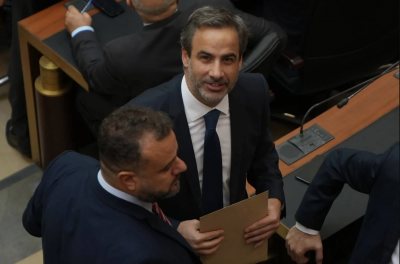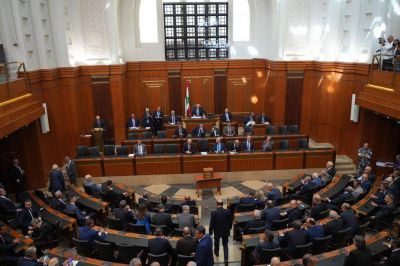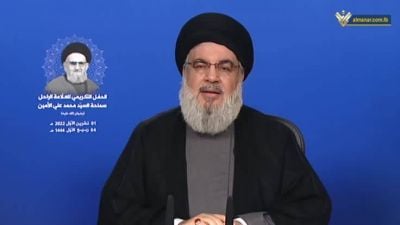
Hezbollah Secretary General Hassan Nasrallah delivers a speech on Saturday. (Screengrab via Al-Manar)
The response did not take long: faced with an opposing camp that participated in last week’s first parliamentary session in the hopes of electing a “confrontational” new president, Hezbollah made sure to let its stance be known.
“Whoever wants a new president should stay away from the logic of defiance,” Hezbollah leader Hassan Nasrallah said in a televised speech Saturday.
The message was addressed not only to the opposition parties that supported the candidacy of MP Michel Moawad — known for his critical positions towards Hezbollah — but also to those parties’ external supporters.
At first glance, Nasrallah’s words carry a message directed in particular to the head of the Lebanese Forces (LF), Samir Geagea, Hezbollah’s antagonist, who has openly advocated for a president that will confront the party and its allies.
In a series of meetings with the opposition groups, Saudi Arabia’s ambassador to Lebanon Walid Bukhari, Geagea’s main supporter, has also called for a “sovereignist figure who would not be affiliated with [pro-Hezbollah] March 8 camp.”
Nasrallah’s statements indicate that Hezbollah has learned its lesson from the May 15 legislative elections — in the newly elected Parliament, neither side has an overall majority, which makes it difficult for Hezbollah to impose the candidate it wants, as was the case in 2016 when current President Michel Aoun ascended to office.
The same applies to the opposing camp.
Thursday’s parliamentary session was “important and showed no political team currently has the parliamentary majority,” Nasrallah said in Saturday’s speech.
During Parliament’s first session to elect a president on Sept. 29, the traditional opposition camp, including the LF, the Kataeb and Walid Joumblatt’s Progressive Socialist Party (PSP), cast their ballots for Moawad, who received 36 votes.
Meanwhile Hezbollah and its allies, including Gebran Bassil’s Free Patriotic Movement (FPM) and Sleiman Frangieh’s Marada – both of whom are seen as presidential candidates, though the FPM leader has repeatedly denied his candidacy — cast blank ballots.
This move was interpreted as Hezbollah’s desire not to “waste” votes on one of its allies — including Frangieh, reportedly the party’s undeclared favorite — knowing that the session was not likely to end in the successful election of a president
Nasrallah added Saturday that the session last week “underlined the need for consultation among the political forces so that we can have a president as soon as possible.”
This is the second time that Hezbollah leader expresses his opposition to a “confrontational” president and advocates instead for an agreement on a candidate, echoing the request of his ally Parliament Speaker Nabih Berri.
On Monday, Berri called a second election session to designate a new president of Lebanon before mid-October, urging parliamentarians to “take their responsibilities” in preparation for this deadline.
Rai sticks to his guns
A few hours before Nasrallah’s speech, Hezbollah’s number two man, Naim Qassem, also criticized the party’s opposing camp, but in a much harsher tone.
“There is no question of electing a president who is provocative and produced by the embassies,” he said in a veiled criticism of Moawad, known for his positive relations with Washington and supported by Riyadh’s main local allies.
These statements, however, did not appear to dishearten Hezbollah’s opposition.
“We are not here to please Hezbollah and satisfy its demands,” an opposition MP told L’Orient-Le Jour, requesting anonymity due to the sensitivity of the ongoing election proceedings.
“We continue to carry out contacts in a bid to unite around a candidate’s name,” the MP said, adding that the opposition camp is making efforts to agree on someone.
The Forces of Change MPs, however, did not vote for Moawad, preferring to give their vote to Salim Eddé, a businessman and a shareholder in L’Orient-Le Jour.
Meanwhile, Maronite Patriarch Bechara al-Rai has also seemed to dig in his heels against Hezbollah and its ally, the Amal Movement.
In his Sunday sermon, the patriarch criticized Amal leader Berri for being the sole person empowered to convene Parliament.
“We fear that the convening of a session remains tied to an agreement that may not be reached,” Rai warned.
“If the representatives do not rise up against themselves and elect a sovereign president, the people should not be blamed if they rise up against them,” he warned
In remarks reported by local media on Saturday, the patriarch also said that “the next president will be elected before Oct. 31.”
This is a scenario that Nasrallah seems to rule out, giving priority to the issue of government formation. Since legislative elections in May, a new cabinet still has not been formed, with the old cabinet still acting in a caretaker capacity. The stalled formation raises fears that an executive vacancy might persist after the end of Aoun’s term.
“Time is running out, and we hope that a government will be formed in the next few days,” Nasrallah said on Saturday, stressing that the future cabinet should be put in place whether the president is elected or not.
In the meantime, international efforts continue to be mobilized in this direction.
“The presidential election is an essential step to start a way out of the crisis in Lebanon,” a spokesperson for the French Foreign Ministry said in a press conference on Saturday.
“It is important that this election takes place within the constitutional deadline, i.e., before Oct. 31, in order to avoid any power vacancy.”
This article was originally published in French in L'Orient-Le Jour. Translation by Sahar Ghoussoub.


